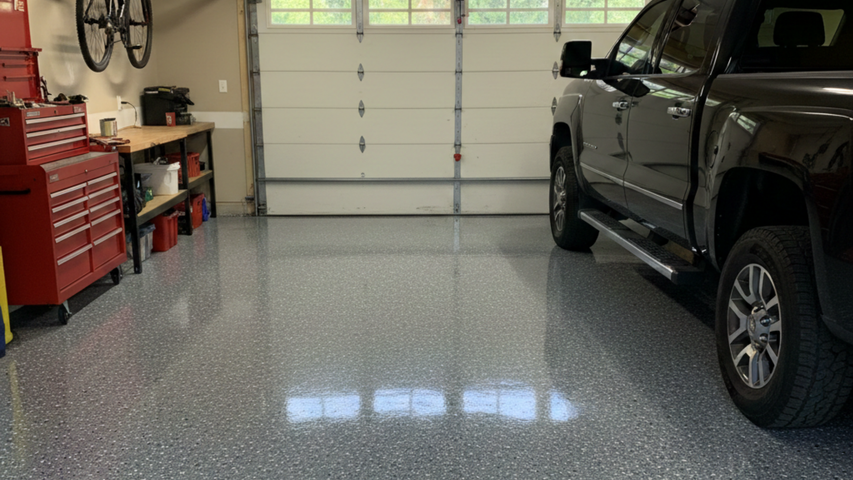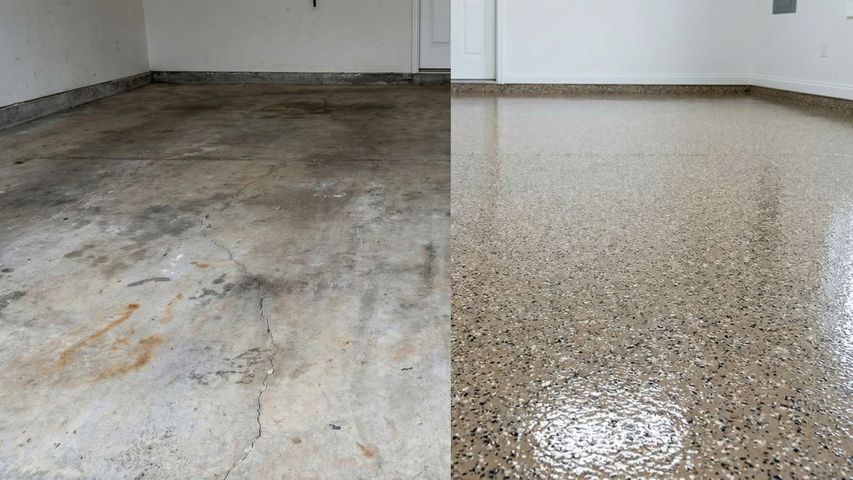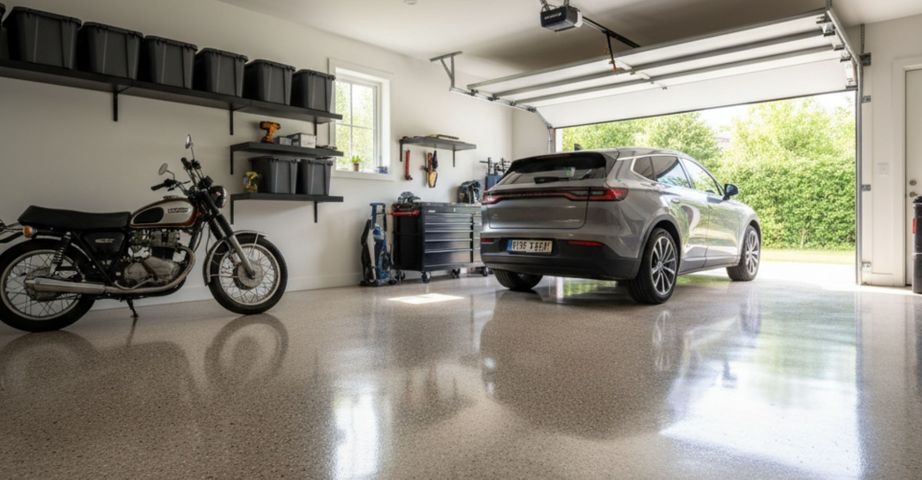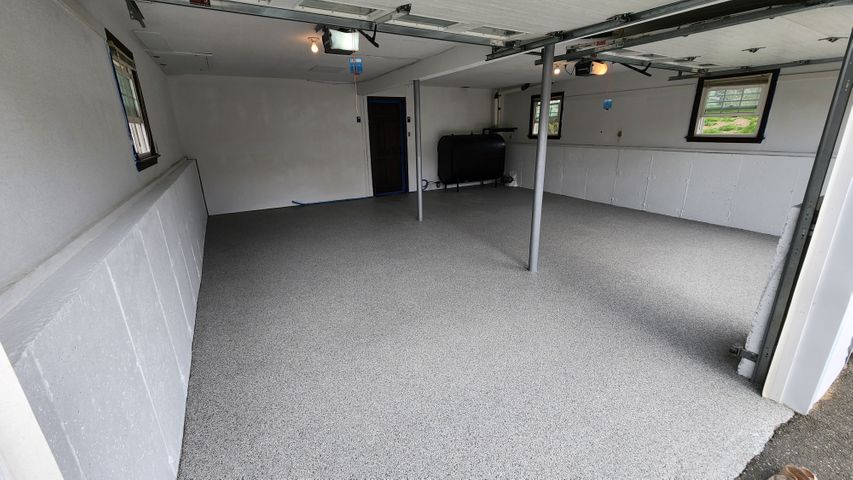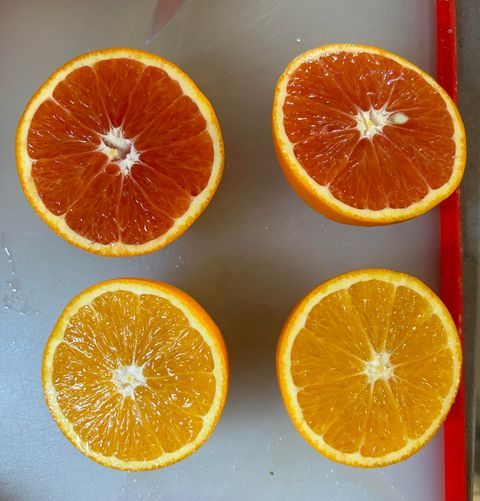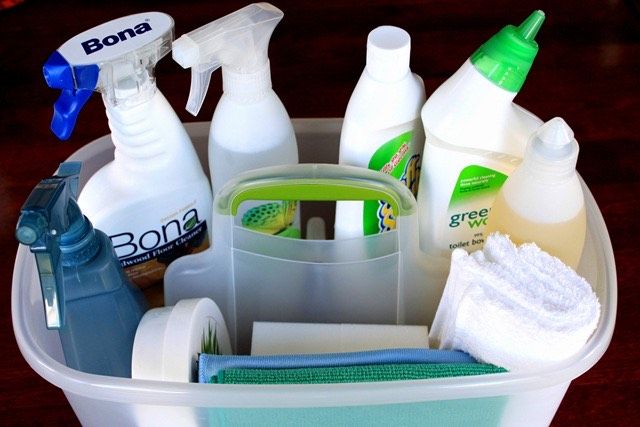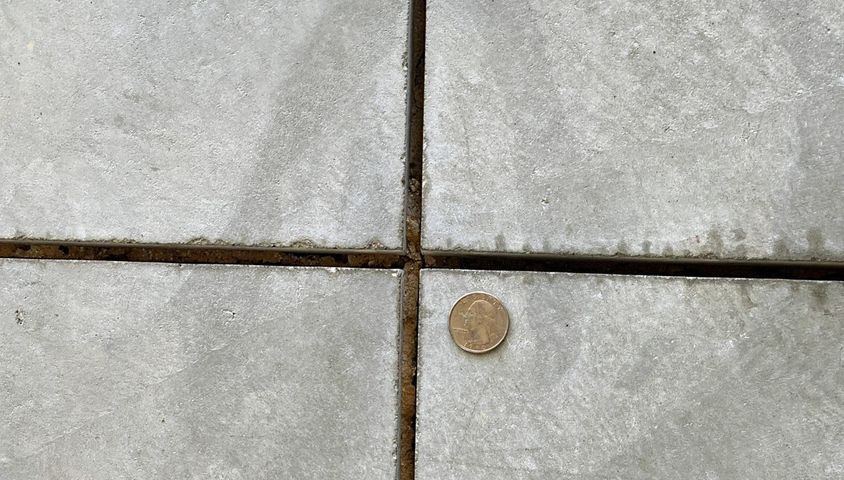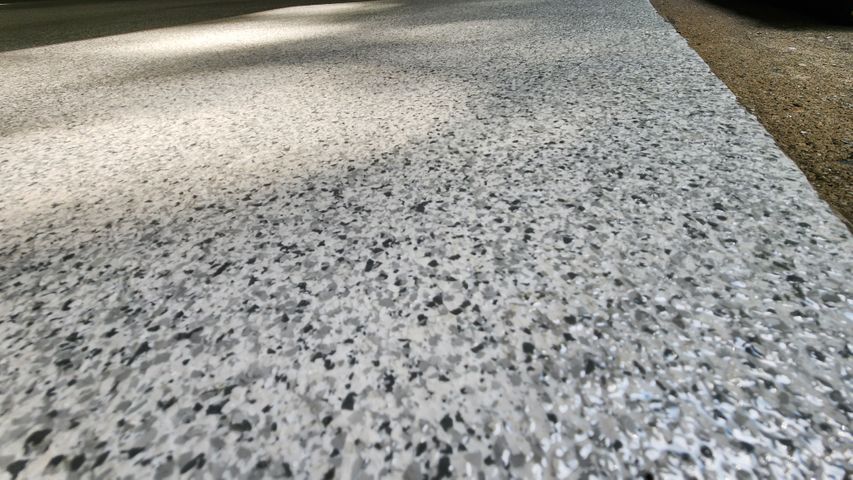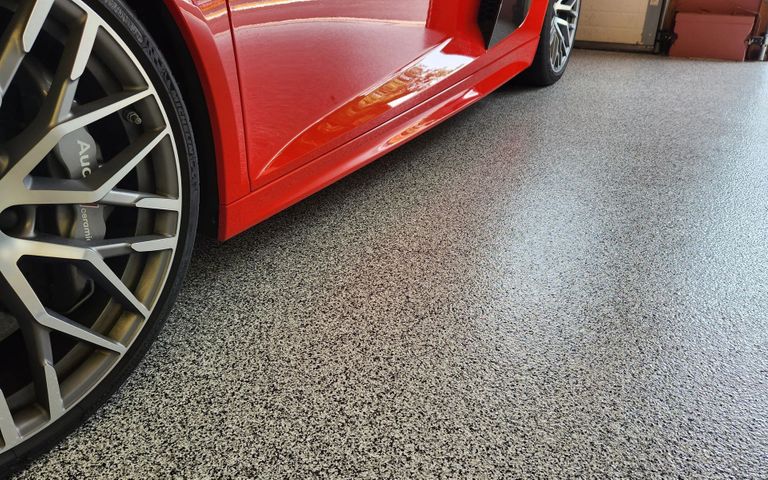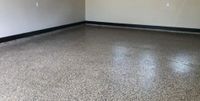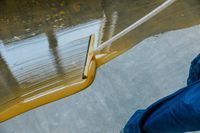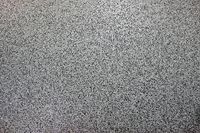Blog
Recent Updates
Essential Care: How to Maintain and Clean Your Epoxy Flooring for Longevity
At Diamond Tuff Epoxy, we believe that a high-quality epoxy floor is a significant investment in your property’s value and functionality. While our industrial-grade coatings are famous for their extreme durability and resistance to wear, a consistent maintenance routine is the secret to keeping that mirror-like shine for decades. Proper care ensures your surface remains a stunning centerpiece of your space.
moreEpoxy Flooring vs. Traditional Flooring: Which is Right for You?
When choosing the best surface for your home or business, the options can feel overwhelming. While traditional concrete or standard garage floor paint might seem like easy fixes, they often fail to hold up against daily wear and tear. We believe in providing solutions that offer both resilience and style, transforming your space into something truly lasting.
moreChoosing the Right Garage Floor Coating for Your Climate
The garage floor endures more abuse from the environment than any other floor in your home, especially when faced with seasonal changes like the harsh winters and humid summers we experience. Choosing the right coating is not just about color; it is a critical decision based on how well the material will withstand your regional weather patterns. As one of the top epoxy floor companies, we believe an informed choice leads to lasting satisfaction and superior durability. We use our precision to ensure your floor stands up to the elements.
moreHow do epoxy or polyaspartic floors make your space safer?
James Roraback
Epoxy and polyaspartic floor coatings enhance floor safety in several ways:
1. Slip Resistance: Both coatings can be mixed with additives like sand, silica, or polymer grit to create a textured, non-slip surface, reducing the risk of slips and falls, especially in wet or oily conditions.
2. Durability and Impact Resistance: Epoxy and polyaspartic coatings form a hard, protective layer that resists cracks, chips, and damage from heavy traffic or dropped objects, minimizing tripping hazards caused by uneven or damaged surfaces.
3. Chemical and Spill Resistance: These coatings are highly resistant to chemicals, oils, and water, preventing slippery residues or surface degradation that could create unsafe conditions.
4. Improved Visibility: Both coatings can be applied in high-gloss or brightly colored finishes, enhancing visibility in low-light environments. Reflective or fluorescent additives can further improve safety by making floors more visible.
5. Easy Maintenance: Their seamless, non-porous surfaces are easy to clean, preventing the buildup of dirt, grease, or bacteria that could pose health or slip risks.
6. UV Stability (Polyaspartic): Polyaspartic coatings are UV-resistant, preventing yellowing or fading when exposed to sunlight, which helps maintain consistent visibility and safety over time.
moreWhat is the difference between polyaspartic and polyurea for applications?
James Roraback
Polyaspartic and polyurea floors are both types of protective coatings used for concrete surfaces, but they have several key differences:
Chemical Composition
Polyaspartic coatings are a subset of polyurea, specifically an aliphatic polyurea. This means they are formulated to be UV stable, which prevents yellowing or fading when exposed to sunlight.
Polyurea is generally aromatic and can be less resistant to UV rays unless specifically formulated otherwise, which might lead to discoloration over time.
Curing Time
Polyaspartic has a slightly longer pot life and curing time than traditional polyurea, offering more time for application and leveling before drying. This feature makes polyaspartic easier to apply, especially for decorative finishes like chip broadcasting.
Polyurea cures extremely quickly, often in just a few minutes, which can be a disadvantage if the coating needs to be spread evenly over a large area because there's less time to correct application errors.
Durability and Flexibility
Both types are known for their durability, chemical resistance, and flexibility. However, polyaspartic might offer better adhesion to concrete due to its slower curing time, which allows for better penetration into the concrete surface.
moreHow do I maintain my new polyaspartic flake floor?
James Roraback
Maintaining a polyaspartic flake floor involves several steps to ensure its longevity and appearance. Here are some key maintenance tips:
Regular Cleaning:
Sweep or Dust Regularly: Use a soft-bristle broom or a vacuum cleaner to remove dirt and debris. This helps prevent scratches and maintains shine.
Mopping: Use a damp mop with a pH-balanced cleaner (Dawn, Simple Green) specifically designed for polyaspartic floors. Avoid harsh chemicals that can damage the finish.
Spot Cleaning:
Address spills and stains promptly to prevent them from setting in. Use a microfiber cloth and a suitable cleaner to spot-clean any problematic areas.
Avoid Harsh Chemicals:
Steer clear of abrasive cleaners, solvents, ammonia, or bleach, as these can degrade the surface. Stick to recommended cleaning solutions for polyaspartic floors.
Prevent Scratches:
Place mats at entry points to reduce the amount of dirt and grit tracked in.
Use felt pads under furniture legs to minimize scratches.
Periodic Recoating:
Depending on the floor's exposure to wear and tear, consider a light recoat every few years to restore its luster and protect against wear.
moreTo Fill Joints or Not To Fill Joints
James Roraback
Filling saw-cut joints in your garage floor with epoxy resin can be beneficial, depending on specific circumstances. Here are some considerations to help you decide:
Advantages of Filling Saw Cut Joints:
1. Preventing dirt and debris accumulation: Filling the joints can help keep dirt, dust, and debris from settling in the gaps, making the floor easier to clean and maintain.
2. Reducing water intrusion: If water is able to enter through the joints, filling them can help prevent moisture concerns, which could lead to issues like mold or damage over time.
3. Improving aesthetics: Filling the joints can give the flooring a finished look and minimize the appearance of cracks and gaps.
4. Preventing further damage: Filling the joints can help prevent the edges from chipping or cracking, which can happen if the joints remain open.
Disadvantages of Filling Saw Cut Joints:
1. Cost and Labor: Filling joints can require additional materials and labor, which could be a consideration if budgets are tight.
2. Flexibility: In some cases, leaving joints open can allow for the natural expansion and contraction of the concrete slab, especially in areas with significant temperature fluctuations.
moreEpoxy vs Polyaspartic vs Polyurea Resinous Floors: The Complete Guide
James Roraback
What is the difference between epoxy, polyaspartic and polyurea resinous floor systems.
Epoxy, polyaspartic, and polyurea are three popular types of resinous flooring systems, each with unique properties, benefits, and applications. Understanding the differences among these flooring options can help in selecting the right system for specific needs. Below is a detailed comparison of the three flooring types:
Epoxy Flooring:
Epoxy flooring consists of a two-part system: a resin and a hardener, which undergo a chemical reaction when mixed, creating a strong, durable surface.
Various formulations exist, including 100% solids, solvent-based, and water-based epoxies.
- Highly durable and resistant to chemicals, abrasion, and impact; suitable for high-traffic areas.
- Takes longer to cure (typically 24 hours) and has a pot life (usable duration after mixing) varying from several hours to a day.
- Can be applied in various thicknesses, often 1/16 to 1/4 inch.
- Less UV stable compared to polyaspartic and polyurea; may yellow or degrade under prolonged sunlight exposure.
Commonly used in commercial settings like warehouses, factories, automotive shops, and food processing facilities.
moreThe Cost Of Polyaspartic Concrete Coatings
James Roraback
What are the associated costs regarding coating my garage or other spaces with polyaspartic concrete coatings?
Coating garage floors with polyaspartic has gained significant popularity in recent years, owing to its durable and aesthetically pleasing properties. In this reflective essay, I will delve into the cost breakdown of this process, shedding light on the various factors that contribute to the overall expenses involved.
The first component to consider when assessing the cost breakdown of coating garage floors with polyaspartic is the materials required for the job. Polyaspartic coatings are known for their high-performance qualities, such as resistance to abrasions, chemicals, and UV rays. While these superior characteristics come at a cost, they are an essential investment in ensuring the longevity and durability of the garage floor coating. Additionally, factors such as the size of the garage and the number of coats needed will influence the overall material expenses.
Labor costs are another crucial aspect to factor into the cost breakdown. Hiring professional contractors with experience in applying polyaspartic coatings is vital to achieving a high-quality finish. The expertise and skill of these professionals come with a price tag, but it is a worthwhile expenditure to ensure that the coating is applied correctly and evenly. Labor costs will vary depending on the complexity of the job, the prep work required, and the timeline for completion.
moreDid you know?
Did you know you can do garage floors during the cold winter months. We heat up the space and use cold tolerant products that allow for maximum quality control for your floor. You get the same lifetime warranty and the highest level of customer service you deserve.
moreEpoxy versus polyaspartic (2 day install versus 1)
Epoxies:
Epoxies were commercialized in the 1950s and are resin-based polymers utilized for their unmatched adhesion strength and durability. These attributes are achieved via epoxy's inherent chemistry, which makes it cure slower and penetrate further into concrete substrates, creating a superior bond for the coating system as a whole.
Epoxy can be applied at a much thicker mil rate than other polymers (from 15 to 50 mils). The added thickness improves the appearance and structural integrity of older concrete floors, which can often be wavy and in disrepair, and also provides increased durability, strength, and impact resistance. Epoxy also has a significantly greater tolerance for being applied to concrete that has higher moisture levels.
Industrial-strength epoxy (not the product sold in kits at retail stores) is the industry standardand is used by the majority of industrial and commercial coatings companies. These companies install polymer concrete coatings in the most demanding locations, including large factories, distribution centers, warehouses, and airplane hangars. They have become so well known, that many use the term "epoxy" as a universal term for any type of polymer coating.
moreRed flags
There are alot of companies and painters out there doing epoxy work. Some are doing it right and bringing value to their customers by installing full floor systems, offering solid warranties and being there for their customers when they need them. Unfortunately there are many others who don't have the experience or are using so called floor systems that aren't really systems at all. Ask the right questions, do your homework and you can avoid costly pitfalls. A couple of red flags to look for are as follows.
Any company that doesn't grind or shot blast should be avoided at all cost. Epoxies need to mechanically bond to the floor to work properly so if the concrete isn't prepped the chance of catastrophic failure increases exponentially.
Companies that strictly acid etch instead of grinding should be avoided as well. Acid etching does provide a bit of a profile and is better than doing nothing but will never provide the profile that a mechanical grinder will. Acid etching will not even out the concrete if there are height variations in the pad whereas a mechanical grinder is designed to even out and provide a smoother concrete floor to build upon.
If a company is vague about what process and products they use then perhaps another company with a much more transparent procedure is the way to go. I walk my customers through exactly what to expect, how we are going to prep, the products we use and the complete process from primer coat to clear coat and everything in between.
moreSome great questions to ask when hiring an epoxy company.
Are you going to grind the floor? This is critical, this generates the proper profile or CSP which stands for the concrete surface profile. Without a profile epoxy products are unable to mechanically bond to the floor properly. This can lead to catastrophic failure which usually presents as bubbling, cracking or delaminating
How are you going to mitigate any oil or contaminate stains? Surface level stains should be removed during the grinding process. Deeper stains should be addressed with a hydrocarbon degrading product to essentially eat the oil, these products are similar to those used in oil spills at sea.
Are you going to use a moisture epoxy primer? This prevents moisture related issues like bubbling, cracking, fish eyes or delamination which will cause a complete failure of the floors integrity. In many cases the only way to repair the floor is to grind everything back to clean white concrete and start from the beginning.
Do you use a seperate epoxy over the primer? Primer should not be flaked into, if your doing a flake floor. Many companies do this, it's quick but it's the wrong process to use due to the weight of the flakes pushing down through the epoxy primer and touching the underlying concrete. This allows moisture, which is always present in concrete, more so if on grade to eventually push up through the primer and fail your floor. Take some time but it's going to happen.
moreWhat is the process for Resurfacing my garage floor?
The first step in the process is going to be grinding or shot blasting the entire surface of the garage floor. This process puts the proper profile on the floor by removing the top layer of concrete which allows the epoxy products to mechanically bond to the concrete surface.
Second step is going to be doing a visual assessment of the entire floor surface to identify any cracks, chips, divots or any other damage that would require filling with an appropriate crack filler. Removing any stains would also fall into this step. Process would depend on what stains are present.
Third step would be to fill all damage areas, address stains and regrind.
Fourth step would be to clean, clean, clean. Alot of sweeping, vacuuming, more sweeping and more vacuuming. Floor must be clean to enable epoxy products to properly bond to floor.
Fifth step would be to get a moisture vapor barrier primer down on the floor to mitigate any possible moisture issues that could cause failure of the floor. This step is critical if the concrete pad is on grade but recommended regardless due to residual moisture that is present in concrete in general.
Sixth step is to begin applying the epoxy layer, at this point flakes or quartz can be broadcast but epoxy can be tinted and left alone as a solid color. Quartz application requires another epoxy layer and a second broadcast but flakes only require a single broadcast. At this point epoxy is left to cure with broadcast materials dying into the epoxy.
more
